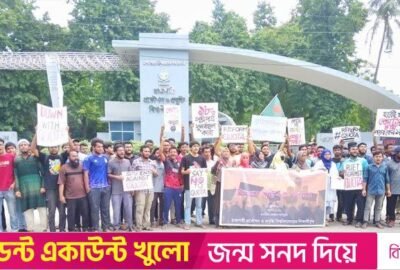Foreign investors continue to divest from Bangladesh
The net foreign portfolio investment in Bangladesh has significantly declined during the first nine months of the fiscal year 2023-24, underscoring the deepening concerns over the country’s economic prospects, the repeated devaluation of the taka, and the instability of its political environment. Data from Bangladesh Bank reveals that net foreign portfolio investment stood at $89 million in the negative from July to March, a sharp increase from the $45 million in the negative recorded during the same period the previous year.
Foreign investors began offloading their shares in 2020, predicting significant devaluations of the local currency. This trend has intensified, driven by currency instability and restrictive market policies. In response to the substantial selling pressure, the Dhaka Stock Exchange (DSE) ceased providing data on foreign investments following verbal instructions from the Bangladesh Securities and Exchange Commission (BSEC).
Saiful Islam, president of the DSE Brokers Association of Bangladesh, highlighted that currency instability and the imposition of a floor price mechanism were the primary reasons behind the massive sale of shares by foreign investors. When the local currency devalues, foreign investors incur losses, prompting them to sell their shares in anticipation of further devaluation. Over the past two years, Bangladesh’s foreign exchange reserves have nearly halved, while the taka has depreciated by approximately 35 percent against the US dollar, according to central bank data.
The imposition of floor prices by the BSEC in 2020, aimed at halting the freefall of market indices, further exacerbated the situation. This measure conflicted with regulatory guidelines in many other countries, as it rendered the local market illiquid and made it difficult for investors to sell shares. Although the floor prices were gradually removed, they were reintroduced in mid-2022 amid the Russia-Ukraine war, causing further instability in the market.
The persistent net selling trend by foreign investors began in fiscal year 2021 and has continued since. In FY21, net sales stood at $269 million in the negative, followed by $158 million in FY22, and $30 million in FY23. The ongoing sell-off has significantly impacted the shares of blue-chip and well-performing companies, which were primarily held by foreign investors. Saiful Islam, who is also a director at Brac EPL Stock Brokerage Ltd, noted that local investors lack the liquidity to absorb this selling pressure, exacerbating the market’s volatility.
A senior official at a leading brokerage firm dealing with a substantial portion of foreign trade stated that foreign investors are predicting further deterioration in Bangladesh’s macroeconomic indicators, leading to further currency devaluation. Consequently, these investors are continuing to divest from the market. Additionally, most blue-chip and multinational companies have reduced their dividends for 2023 due to the US dollar shortage, further dampening investor confidence.
Frequent policy changes have further discouraged foreign investors from maintaining their funds in the Bangladeshi stock market. The imposition of floor prices and the introduction of a stringent 3 percent lower circuit breaker after the withdrawal of floor prices have caught investors off guard, limiting their ability to exit the market smoothly. This has been a significant deterrent, as foreign investors typically avoid markets with restrictive exit mechanisms.
The BSEC’s efforts to attract foreign investors have been questioned, with critics pointing out that only a few companies suitable for foreign investment have been listed in the past 15 years. Simply arranging roadshows is insufficient to draw investors to the market. The experience of sudden policy changes, such as the Bangladesh Telecommunication Regulatory Commission’s ban on Grameenphone from selling SIM cards in June 2022, has also eroded investor confidence. Although the restriction was lifted after six months, the decision had already dented the company’s share price and shaken investor confidence.
Similarly, in 2015, the Bangladesh Energy Regulatory Commission’s decision to cut the distribution charge for Titas Gas resulted in a significant loss of market value for the utility company. These abrupt policy shifts have left foreign investors wary of the regulatory environment in Bangladesh, further fueling their divestment.
The economic backdrop against which these developments are unfolding is characterized by several challenges. Bangladesh, like many other emerging economies, has been grappling with the fallout from the COVID-19 pandemic, which disrupted supply chains, reduced remittances, and slowed economic growth. The subsequent global economic uncertainties, exacerbated by the Russia-Ukraine war, have put additional pressure on the country’s economic stability.
The ongoing foreign currency crunch has also made it difficult for foreign investors to repatriate profits, contributing to the sell-off. Bangladesh’s forex reserve depletion and the corresponding depreciation of the taka have further compounded the economic woes. This situation has led to higher import costs, inflationary pressures, and a broader economic slowdown, making the investment climate less attractive.
The corporate sector in Bangladesh has not been immune to these challenges. Many blue-chip companies and multinationals, which are typically the preferred investment targets for foreign investors, have had to reduce their dividends due to the dollar shortage. This reduction in dividends has further undermined investor confidence, as these companies are seen as bellwethers for the broader market.
Moreover, the imposition of floor prices and stringent circuit breakers has made the market less liquid and more volatile, deterring both foreign and local investors. The regulatory environment, marked by sudden and unpredictable policy shifts, has added another layer of uncertainty, making it difficult for investors to plan their investments with confidence.
Despite the ongoing challenges, there is some hope that the selling pressure from foreign investors will ease as they have already divested a large portion of their holdings. Saiful Islam expressed optimism that the situation may stabilize, although the impact of continued economic uncertainty and political instability remains a concern.
To regain the confidence of foreign investors, it is crucial for Bangladesh to address the underlying issues of currency stability and policy consistency. Creating a more predictable and investor-friendly regulatory environment is essential for attracting and retaining foreign investment. This includes ensuring that market regulations align with international standards, providing a stable economic environment, and avoiding abrupt policy changes that could unsettle investors.
Improving transparency and communication with investors is also vital. This means not only providing accurate and timely data but also engaging with investors to understand their concerns and address them proactively. By taking these steps, Bangladesh can begin to restore confidence in its stock market and attract the foreign investment needed to support its long-term economic growth.
The road ahead may be challenging, but with a concerted effort to stabilize the economy and improve market conditions, Bangladesh can create a more favorable environment for investment. This will require a commitment to sound economic management, consistent policy implementation, and a focus on building a resilient and dynamic market that can weather future economic storms.
The post Foreign investors continue to divest from Bangladesh appeared first on BLiTZ.






